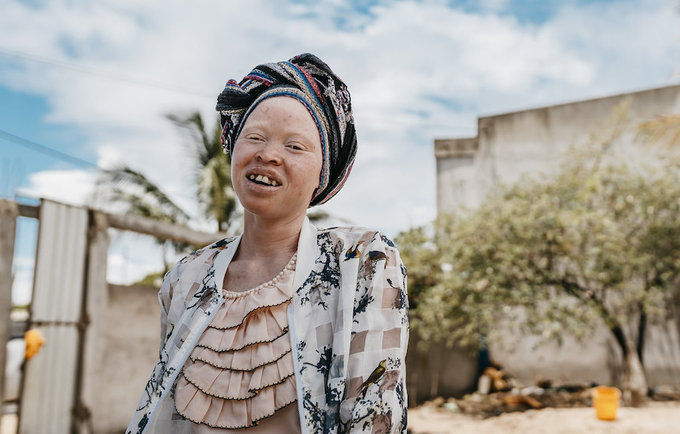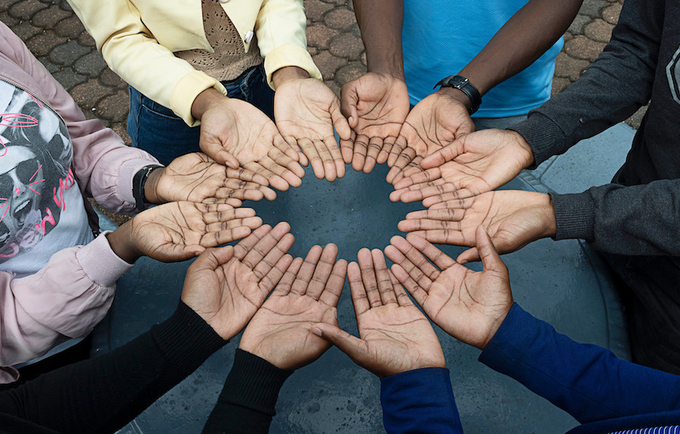All women and girls – including those with disabilities – have a right to bodily autonomy
3 December 2023

Bastina, 18, lives with albinism and is a member of Rapariga Biz, in Mozambique. Her mother abandoned her when she was young because of her albinism.
© UNFPA Mozambique
Statement by UNFPA Executive Director on the International Day of Persons with Disabilities
Persons with disabilities are too often defined by what they cannot do, or by what society assumes they cannot do. The International Day for Persons with Disabilities is a moment to recognize the important contributions, achievements and leadership they demonstrate in making our societies more just, equitable, and inclusive.
Today, more national laws and policies protect the rights of persons with disabilities than ever before. Services are increasingly responsive to their specific needs, and there is increased attention on supporting people with disabilities to have access to sexual and reproductive health information and services as well as safe, healthy and satisfying intimate relationships. Statistical systems are better at capturing data relevant to their experiences. In telling a fuller story of the disparities and discrimination faced by persons with disabilities, these data help expose and close critical gaps.
One in five women globally is a person with a disability. Yet from households to parliaments, too few are empowered to make decisions that have far-reaching consequences for their bodies and lives. This includes fundamental choices about their sexual and reproductive health and rights, the foundation for bodily autonomy, wellbeing and ability to determine their own future.
Women and girls with disabilities may be up to three times more likely to be involuntarily sterilized than the general population. Violence also blocks women and girls with disabilities from realizing their full potential. Online and offline, in homes and chatrooms, they confront significant risks of harassment and harm, including rates of intimate partner violence two to four times higher than their counterparts without disabilities.
Change is happening but needs to pick up speed. UNFPA’s close collaboration with movements of women with disabilities has helped galvanize momentum. Together, we are developing tools to protect rights and choices and uproot discrimination. Our partnership with Women Enabled International has produced guidelines that are improving the quality of sexual and reproductive health care and services in over 70 countries, ensuring they meet the diverse needs of persons with disabilities. In Eastern Europe and Asia, UNFPA is training health-care providers on specific skills to assess and respond to gender-based violence against persons with disabilities.
Through the We Decide programme, UNFPA promotes the human rights and social inclusion of persons with disabilities, particularly women and young people. Our goal is to expand access to sexual and reproductive health services as well as the information and education people need to make the best choices for themselves.
Today and every day, UNFPA stands with persons with disabilities globally in their call for action to protect and promote their fundamental rights, and support their leadership in shaping more inclusive and peaceful societies for everyone.
STATEMENT
Ending inequalities and empowering communities are key to vanquishing AIDS pandemic
1 December 2023
 © UNFPA Eswatini
© UNFPA EswatiniStatement by UNFPA Executive Director on World AIDS Day
The world has made remarkable strides in curbing the AIDS pandemic. There is much to celebrate: New HIV infections have dramatically slowed, and AIDS-related deaths are down 51 per cent from 2010. Yet, we are not at the finish line: The virus still claims far too many lives – an average of one per minute in 2022 – and progress towards ending HIV transmission remains uneven.
Ending AIDS as a public health threat by 2030 requires halting the epidemics of gender inequality and of the gender-based violence that fuel its spread.
Women and girls are twice as likely to acquire HIV and other sexually transmitted infections (STIs) as men and boys. They can face difficulties negotiating safer sex due to unequal power balances, and often have limited access to information about HIV prevention and fewer resources to access preventive measures. Sexual violence also increases the risk of HIV transmission. Women who face intimate partner violence in countries with high HIV prevalence are up to 50 percent more likely to acquire the virus.
Inequalities as well as stigma and discrimination endanger too many people. Sex workers, men who have sex with men and transgender people, among other marginalized groups, are also at higher risk of contracting STIs– and of slipping through the cracks of health-care systems.
Empowering affected communities stands out as a proven strategy to address these challenges. Community-led responses can better reach high-risk individuals, tailor interventions to localized needs, improve access to health care, and reduce inequalities in service delivery.
UNFPA sees the power of community action every day through its work with local advocates around the world. For example, Teenergizer, a regional network in Eastern European and Central Asia, brings together young people to promote HIV awareness and health lifestyles among peers, including through online learning and counselling services. TransWave Jamaica, a transgender-led civil society organization, is developing a service referral system for the specific needs of trans people.
In East and Southern Africa, the 2gether 4 SRHR programme mobilizes “mentor mothers” and community health-care workers to help people living with HIV access health services and contraceptives. Youth LEAD convenes LGBTQI+ people in Asia and the Pacific to stand up for their rights.
Embedded in local communities, these organizations are able to integrate robust protection measures into daily life to address stigma and discrimination and to make inclusive prevention the standard, not the exception.
Yet, as powerful as community organizations can be in making change, they cannot do it alone. Ending AIDS as a public health threat also requires significant, sustained investment and political will from decision-makers at all levels..
Working together, we can pave the way towards a world where prevention is inclusive and comprehensive healthcare is accessible to everyone, whoever and wherever they are, providing hope and dignity for all.
No comments:
Post a Comment